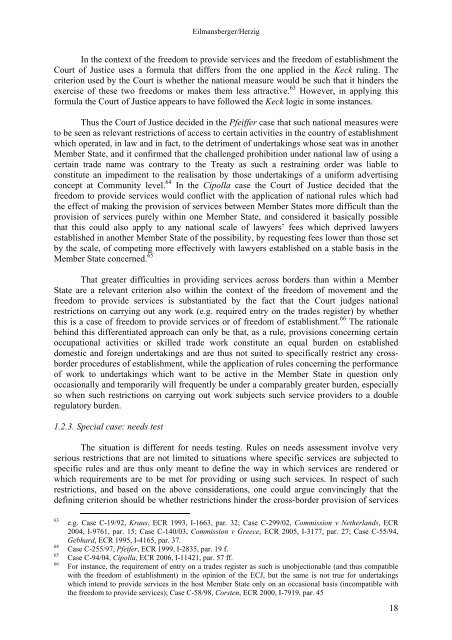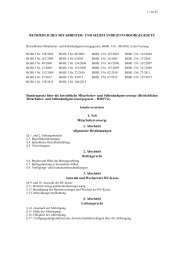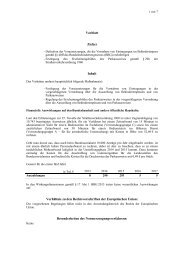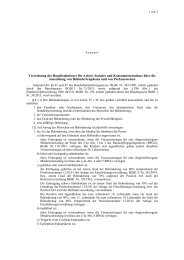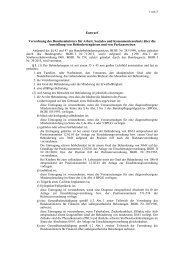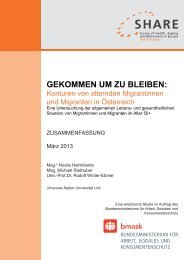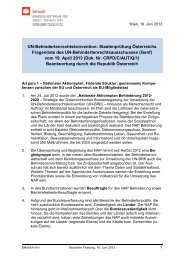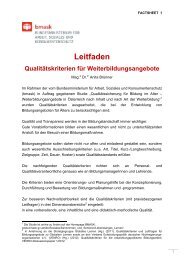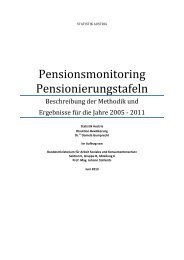Social Services of General Interest (SSGI)
Social Services of General Interest (SSGI)
Social Services of General Interest (SSGI)
Create successful ePaper yourself
Turn your PDF publications into a flip-book with our unique Google optimized e-Paper software.
Eilmansberger/Herzig<br />
In the context <strong>of</strong> the freedom to provide services and the freedom <strong>of</strong> establishment the<br />
Court <strong>of</strong> Justice uses a formula that differs from the one applied in the Keck ruling. The<br />
criterion used by the Court is whether the national measure would be such that it hinders the<br />
exercise <strong>of</strong> these two freedoms or makes them less attractive. 63 However, in applying this<br />
formula the Court <strong>of</strong> Justice appears to have followed the Keck logic in some instances.<br />
Thus the Court <strong>of</strong> Justice decided in the Pfeiffer case that such national measures were<br />
to be seen as relevant restrictions <strong>of</strong> access to certain activities in the country <strong>of</strong> establishment<br />
which operated, in law and in fact, to the detriment <strong>of</strong> undertakings whose seat was in another<br />
Member State, and it confirmed that the challenged prohibition under national law <strong>of</strong> using a<br />
certain trade name was contrary to the Treaty as such a restraining order was liable to<br />
constitute an impediment to the realisation by those undertakings <strong>of</strong> a uniform advertising<br />
concept at Community level. 64 In the Cipolla case the Court <strong>of</strong> Justice decided that the<br />
freedom to provide services would conflict with the application <strong>of</strong> national rules which had<br />
the effect <strong>of</strong> making the provision <strong>of</strong> services between Member States more difficult than the<br />
provision <strong>of</strong> services purely within one Member State, and considered it basically possible<br />
that this could also apply to any national scale <strong>of</strong> lawyers’ fees which deprived lawyers<br />
established in another Member State <strong>of</strong> the possibility, by requesting fees lower than those set<br />
by the scale, <strong>of</strong> competing more effectively with lawyers established on a stable basis in the<br />
Member State concerned. 65<br />
That greater difficulties in providing services across borders than within a Member<br />
State are a relevant criterion also within the context <strong>of</strong> the freedom <strong>of</strong> movement and the<br />
freedom to provide services is substantiated by the fact that the Court judges national<br />
restrictions on carrying out any work (e.g. required entry on the trades register) by whether<br />
this is a case <strong>of</strong> freedom to provide services or <strong>of</strong> freedom <strong>of</strong> establishment. 66 The rationale<br />
behind this differentiated approach can only be that, as a rule, provisions concerning certain<br />
occupational activities or skilled trade work constitute an equal burden on established<br />
domestic and foreign undertakings and are thus not suited to specifically restrict any crossborder<br />
procedures <strong>of</strong> establishment, while the application <strong>of</strong> rules concerning the performance<br />
<strong>of</strong> work to undertakings which want to be active in the Member State in question only<br />
occasionally and temporarily will frequently be under a comparably greater burden, especially<br />
so when such restrictions on carrying out work subjects such service providers to a double<br />
regulatory burden.<br />
1.2.3. Special case: needs test<br />
The situation is different for needs testing. Rules on needs assessment involve very<br />
serious restrictions that are not limited to situations where specific services are subjected to<br />
specific rules and are thus only meant to define the way in which services are rendered or<br />
which requirements are to be met for providing or using such services. In respect <strong>of</strong> such<br />
restrictions, and based on the above considerations, one could argue convincingly that the<br />
defining criterion should be whether restrictions hinder the cross-border provision <strong>of</strong> services<br />
63 e.g. Case C-19/92, Kraus, ECR 1993, I-1663, par. 32; Case C-299/02, Commission v Netherlands, ECR<br />
2004, I-9761, par. 15; Case C-140/03, Commission v Greece, ECR 2005, I-3177, par. 27; Case C-55/94,<br />
Gebhard, ECR 1995, I-4165, par. 37.<br />
64 Case C-255/97, Pfeifer, ECR 1999, I-2835, par. 19 f.<br />
65 Case C-94/04, Cipolla, ECR 2006, I-11421, par. 57 ff.<br />
66 For instance, the requirement <strong>of</strong> entry on a trades register as such is unobjectionable (and thus compatible<br />
with the freedom <strong>of</strong> establishment) in the opinion <strong>of</strong> the ECJ, but the same is not true for undertakings<br />
which intend to provide services in the host Member State only on an occasional basis (incompatible with<br />
the freedom to provide services); Case C-58/98, Corsten, ECR 2000, I-7919, par. 45<br />
18


